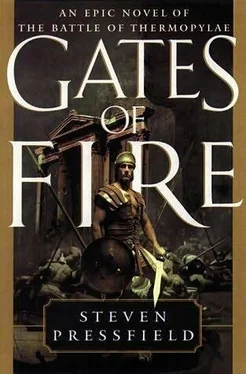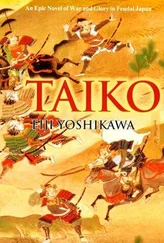Steven Pressfield - Gates of Fire - An Epic Novel of the Battle of Thermopylae
Здесь есть возможность читать онлайн «Steven Pressfield - Gates of Fire - An Epic Novel of the Battle of Thermopylae» весь текст электронной книги совершенно бесплатно (целиком полную версию без сокращений). В некоторых случаях можно слушать аудио, скачать через торрент в формате fb2 и присутствует краткое содержание. Жанр: Историческая проза, на английском языке. Описание произведения, (предисловие) а так же отзывы посетителей доступны на портале библиотеки ЛибКат.
- Название:Gates of Fire: An Epic Novel of the Battle of Thermopylae
- Автор:
- Жанр:
- Год:неизвестен
- ISBN:нет данных
- Рейтинг книги:3 / 5. Голосов: 1
-
Избранное:Добавить в избранное
- Отзывы:
-
Ваша оценка:
- 60
- 1
- 2
- 3
- 4
- 5
Gates of Fire: An Epic Novel of the Battle of Thermopylae: краткое содержание, описание и аннотация
Предлагаем к чтению аннотацию, описание, краткое содержание или предисловие (зависит от того, что написал сам автор книги «Gates of Fire: An Epic Novel of the Battle of Thermopylae»). Если вы не нашли необходимую информацию о книге — напишите в комментариях, мы постараемся отыскать её.
Gates of Fire: An Epic Novel of the Battle of Thermopylae — читать онлайн бесплатно полную книгу (весь текст) целиком
Ниже представлен текст книги, разбитый по страницам. Система сохранения места последней прочитанной страницы, позволяет с удобством читать онлайн бесплатно книгу «Gates of Fire: An Epic Novel of the Battle of Thermopylae», без необходимости каждый раз заново искать на чём Вы остановились. Поставьте закладку, и сможете в любой момент перейти на страницу, на которой закончили чтение.
Интервал:
Закладка:
The years had passed swiftly. Alexandras completed his service as a youth of the agoge; he was given his war shield and assumed his station among the Peers of the army. He took to wife the maiden Agathe, just as he had promised. She bore him twins, a boy and girl, before he was twenty.
Polynikes was crowned at Olympia for the second time, victor again in the sprint in armor. His wife, Altheia, bore him a third son.
The lady Arete produced for Dienekes no more children; she had come up barren after four daughters, without producing a male heir.
Rooster's wife, Harmonia, bore a second child, a boy whom he named Messenieus. The lady Arete attended the birth, providing her own midwife and assisting at the delivery with her own hands. I myself bore the torch that escorted her home. She would not speak, so torn was she between the joy of witnessing at last from her line the birth of a male, a defender for Lakedaemon, and the sorrow of knowing that this boy-child, issue of her brother's bastard, Rooster, with all his treasonous defiance of his Spartan masters, right down to the name he had chosen for his son, would face the sternest and most perilous passage to manhood.
The Persian myriads stood now in Europe. They had bridged the Hellespont and traversed all of Thrace. Still the Hellenic allies wrangled. A force of ten thousand heavy in-fantry, commanded by the Spartan Euanetus, was dispatched to Tempe in Thessaly, there to make a stand against the invader at the northernmost frontier of Greece. But the site, when the army got there, proved undefendable. The position could be turned by land via the pass at Gonnus and outflanked by sea through Aulis.
In disgrace and mortification the force of Ten Thousand pulled out and dispersed to its constituent cities.
A desperate paralysis possessed the Congress of the Greeks. Thessaly, abandoned, had gone over to the Persian, adding her matchless cavalry to swell the squadrons of the foe. Thebes teetered at the brink of submission. Argos was sitting it out. Dread omens and prodigies abounded. The Oracle of Apollo at Delphi had counseled the Athenians, Fly to the ends of the earth while the Spartan Council of Elders, notoriously slow to action, yet dithered and dawdled. A stand must be made somewhere. But where?
In the end it was their women who galvanized the Spartans into action. It came about like this.
Refugees, many brides with babes, were flooding into the last of the free cities. Young mothers took flight to Lakedaemon, islanders and relations fleeing the Persian advance across the Aegean. These brides inflamed their listeners' hatred of the foe with tales of the conquerors' atrocities in their earlier passage through the islands: how the enemy at Chios and Lesbos and Tenedos had formed dragnets at one end of the territory and advanced across each island, scouring out every hiding place, hauling forth the young boys, herding the handsomest together and castrating them for eunuchs, killing every man and raping the women, selling them forth into foreign slavery. The babies' heads these heroes of Persia dashed against the walls, splattering their brains upon the paving stones.
The wives of Sparta listened with icy fury to these tales, cradling their own infants at their breasts. The Persian hordes had swept now through Thrace and Macedonia. The baby-murderers stood upon the doorstep of Greece, and where was Sparta and her warrior defenders? Blundering homeward unblooded from the fool's errand of Tempe.
I had never seen the city in such a state as in the aftermath of that debacle. Heroes with prizes of valor skulked about, countenances downcast with shame, while their women snapped at them with scorn and held themselves aloof and disdainful. How could Tempe have happened? Any battle, even a defeat, would have been preferable to none at all. To marshal such a magnificent force, garland it before the gods, transport it all that way and not draw blood, even one's own, this was not merely disgraceful but, the wives declared, blasphemous.
The women's scorn excoriated the city. A delegation of wives and mothers presented itself to the ephors, insisting that they themselves be sent out next time, armed with hairpins and distaffs, since surely the women of Sparta could disgrace themselves no more egregiously nor accomplish less than the vaunted Ten Thousand.
In the warriors' messes the mood was even more corrosive. How much longer would the Allied Congress dither? How many more weeks would the ephors delay?
I recall vividly the morning when at last the proclamation came. The Herakles regiment trained that day in a dry watercourse called the Corridor, a blistering funnel between sand banks north of the village of Limnai. The men were running impact drills, two-on-ones and three-on-twos, when a distinguished elder named Charilaus, who had been an ephor and a priest of Apollo but now functioned primarily as a senior counselor and emissary, appeared on the crest of the bank and spoke aside to the polemarch Derkylides, the regimental commander. The old man was past seventy; he had lost the lower half of a leg in battle years past. For him to have hobbled on his staff this far from the city could only mean something big had happened.
The patriarch and the polemarch spoke in private. The drills went on. No one looked up, yet every man knew.
This was it.
Dienekes' men got the word from Laterides, commander of the adjacent platoon, who passed it down the line.
It's the Gates, lads.
The Hot Gates.
Thermopylae.
No assembly was called. To the astonishment of all, the regiment was dismissed. The men were given the whole rest of the day off.
Such a holiday had only been granted half a dozen times in my memory; invariably the Peers broke up in high spirits and made for home at the trot. This time no one budged. The entire regiment stood nailed to the site, in the sweltering confines of the dry river, buzzing like a hive.
Here was the word:
Four morai, five thousand men, would be mobilized for Thermopylae. The column, reinforced by four perioikic regiments and packing squires and armed helots two to a man, would march out as soon as the Karneia, the festival of Apollo which prohibited taking up arms, expired. Two and half weeks.
The force would total twenty thousand men, twice the number at Tempe, concentrated in a pass ten times narrower.
Another thirty to fifty thousand allied infantry would be mobilized behind this initial force, while a main force of the allied navy, a hundred and twenty ships of war, would seal the straits at Artemisium and Andros and the narrows of the Euripus, protecting the army at the Gates from flank assault by sea.
This was a massive call-up. So massive it smelled. Dienekes knew it and so did everyone else.
My master humped back to the city accompanied by Alexandros, now a full line warrior of the platoon, his mates Bias, Black Leon and their squires. A third of the way along we overtook the elder Charilaus, shambling home with painful slowness, supported by his attendant, Sthenisthes, who was as ancient as he. Black Leon led an ass of the train on a halter; he insisted the old man ride. Charilaus declined but permitted the place to his servant.
Cut through the shit for us, will you, old uncle? Dienekes addressed the statesman affectionately but with a soldier's impatience for the truth.
I relay only what I'm instructed, Dienekes.
The Gates won't hold fifty thousand. They won't hold five.
A wry expression wizened the old-timer's face. I see you fancy your generalship superior to Leonidas'.
One fact was self-evident even to us squires. The Persian army stood now in Thessaly. That was what, ten days to the Gates? Less? In two and a half weeks their millions would sweep through and be eighty miles beyond. They'd be parked upon our threshold.
Читать дальшеИнтервал:
Закладка:
Похожие книги на «Gates of Fire: An Epic Novel of the Battle of Thermopylae»
Представляем Вашему вниманию похожие книги на «Gates of Fire: An Epic Novel of the Battle of Thermopylae» списком для выбора. Мы отобрали схожую по названию и смыслу литературу в надежде предоставить читателям больше вариантов отыскать новые, интересные, ещё непрочитанные произведения.
Обсуждение, отзывы о книге «Gates of Fire: An Epic Novel of the Battle of Thermopylae» и просто собственные мнения читателей. Оставьте ваши комментарии, напишите, что Вы думаете о произведении, его смысле или главных героях. Укажите что конкретно понравилось, а что нет, и почему Вы так считаете.












